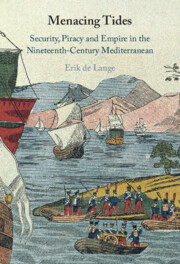Description
Menacing Tides
Security, Piracy and Empire in the Nineteenth-Century Mediterranean
Author: de Lange Erik
Language: English
Subject for Menacing Tides:
Publication date: 04-2024
346 p. · Hardback
346 p. · Hardback
Description
/li>Contents
/li>Biography
/li>
New ideas of security spelled the end of piracy on the Mediterranean Sea during the nineteenth century. As European states ended their military conflicts and privateering wars against one another, they turned their attention to the 'Barbary pirates' of Algiers, Tunis and Tripoli. Naval commanders, diplomats, merchant lobbies and activists cooperated for the first time against this shared threat. Together, they installed a new order of security at sea. Drawing on European and Ottoman archival records ? from diplomatic correspondence and naval journals to songs, poems and pamphlets ? Erik de Lange explores how security was used in the nineteenth century to legitimise the repression of piracy. This repression brought European imperial expansionism and colonial rule to North Africa. By highlighting the crucial role of security within international relations, Menacing Tides demonstrates how European cooperation against shared threats remade the Mediterranean and unleashed a new form of collaborative imperialism.
Introduction; 1. Of knights and pirates. Barbary corsairing before and during the Congress of Vienna, 1814–1815; 2. Opening fire. The Anglo-Dutch bombardment of Algiers, 1815–1816; 3. 'To give law to the world'. Contesting security, 1816–1824; 4. 'No security, except in destruction'. The French invasion of Algiers, 1827–1830; 5. Beyond the Littoral. Treaties, colonies and legacies, 1830–1856; Conclusion.
Erik de Lange is an Assistant Professor at Utrecht University. He completed his PhD within the ERC-funded research project 'Securing Europe, Fighting Its Enemies. The Making of a Security Culture in Europe and Beyond, 1815–1914'. In 2022–2024, he was a visiting research fellow at King's College London.
© 2024 LAVOISIER S.A.S.




